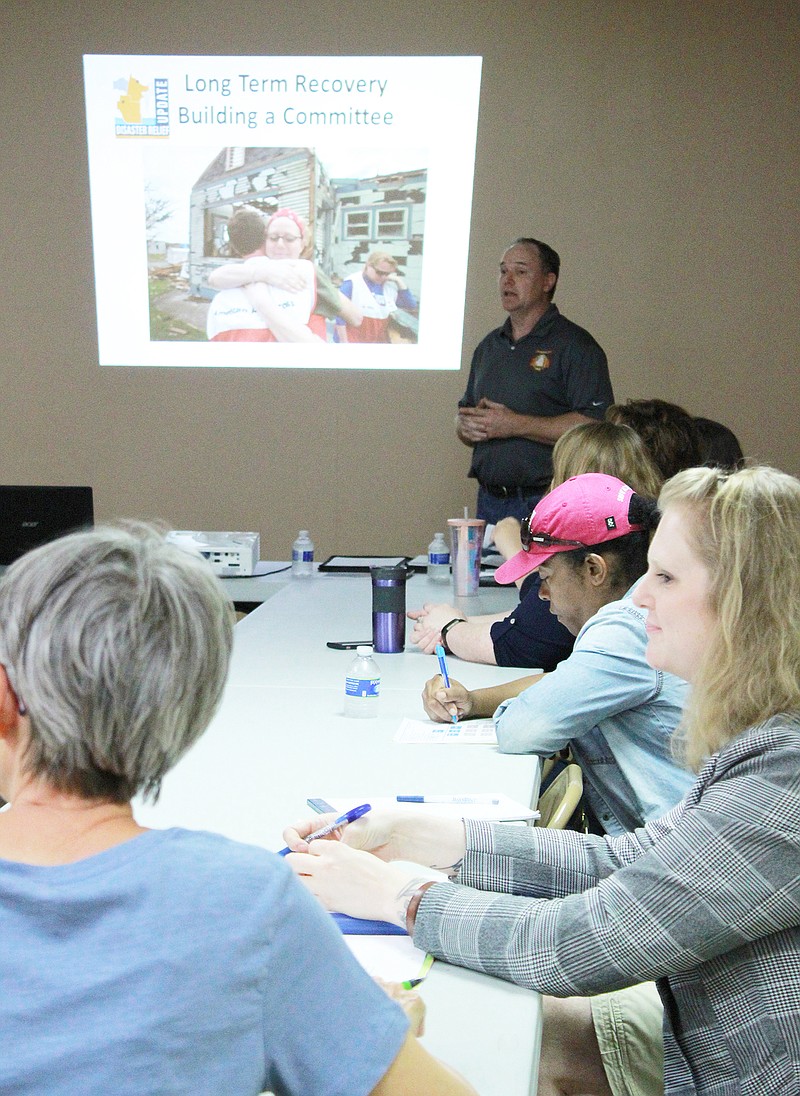It's been just more than three months since Cole and Miller counties were hit by a major tornado, and while the recovery process has gone at a faster pace than has been seen in other similarly affected areas, that process will go on for several more months.
Emergency personnel and local nonprofits have formed a Long-Term Recovery Committee to help provide services for disaster victims affected by the tornado as well as flooding that affected the area several weeks after the tornado.
The LTRC is looking for volunteers to serve on three subcommittees - donations & volunteers, community outreach and housing. It is asking for people who have experience with behavioral health, case management, construction project management, home repairs and construction, fundraising, spiritual or emotional help, or volunteer management, according to the United Way of Central Missouri.
The LTRC governing board held the first of two information sessions Monday at Memorial Baptist Church on Madison Street. The second session will be at 6:30 p.m. today, at the Eldon Community Center, 209 E. 2nd St., in Eldon.
Ann Bax, president of the local United Way organization, and Willard Haley, a retired administrator from the Eldon School District, are to be co-chairs of the committee, Bax said.
The subcommittees are intended to help manage victims' recovery. The subcommittee volunteers will help in areas such as coordinating material and cash donations as well as exploring and identifying rental property available. An estimated 80 percent of the properties damaged or destroyed in the tornado were rental properties.
Those who came to Monday's meeting were interested in being volunteers and said they had worked with various faith based agencies in the past during disasters and wanted to do so again.
The first layer of recovery is insurance, Bax said. The next layer is the Federal Emergency Management Agency.
"If people don't register with FEMA, they'll be more dependent on local resources," Bax said. "To get the maximum support, we want them to register with FEMA."
A concern, she said, is people will miss out on federal funding and cause an unnecessary drain on local resources.
"What FEMA can't do for survivors - that's where Catholic Charities of Central and Northeast Missouri and the LTRC will get involved."
Catholic Charities is conducting case management - connecting victims with resources. The cases are kept highly confidential, Bax said.
As of Monday, 450 households in Cole County have registered with FEMA and 147 have done so in Miller County.
"Many will get denial letters, but keep that letter," Bax said. "You need to take it to the local FEMA people and let them walk through it with you. Many times, they'll help you appeal it, and you'll get some sort of award."
It's not easy, and there's no "magic wand," she continued.
FEMA's Disaster Recovery Center that was located in the Cole County/Jefferson City Emergency Management Office on Southridge Drive has closed. However, disaster survivors are still encouraged to call 1-800-621-3362 or visit www.DisasterAssistance.gov to apply for FEMA financial assistance if they haven't already.
The deadline to register is Sept. 9.
Those who want to volunteer on one of the LTRC subcommittees are asked to come to a Sept. 12 meeting at the United Way of Central Missouri, 205 Alameda Drive, in Jefferson City, starting at 8 a.m. For more information about the LTRC, contact Bax at 636-4100 or [email protected].

